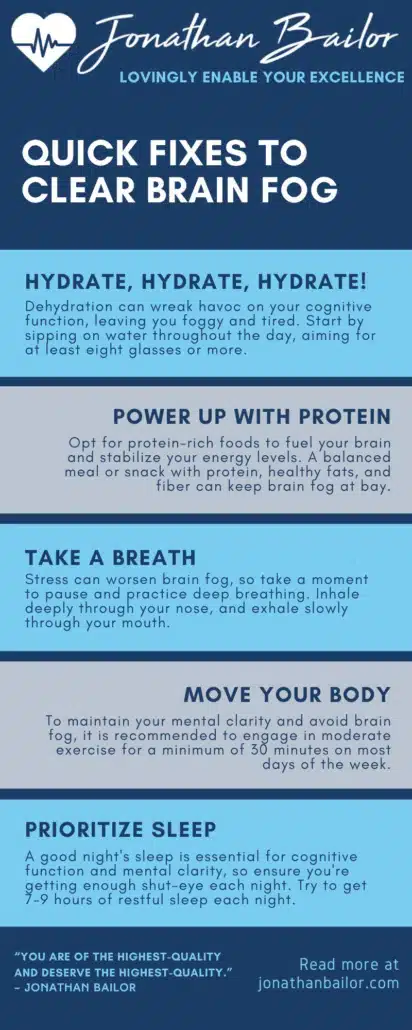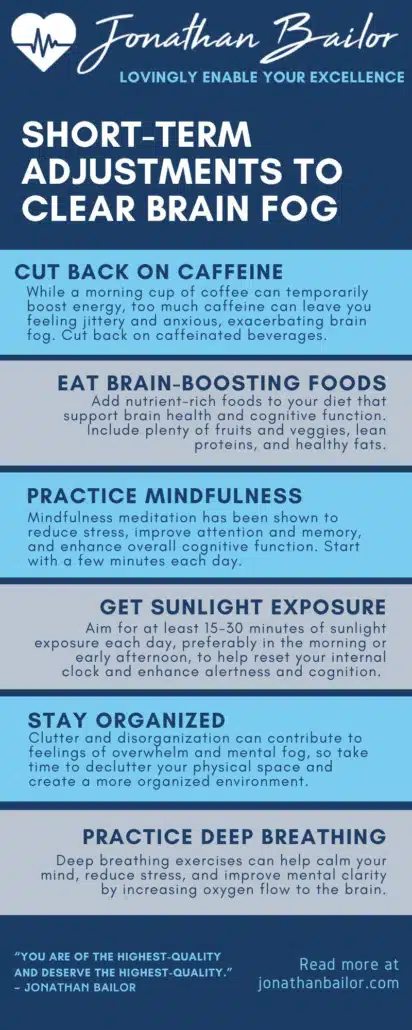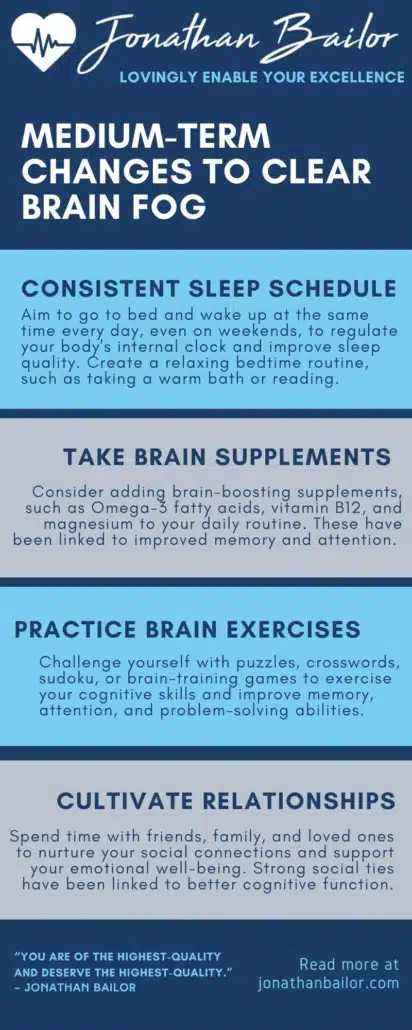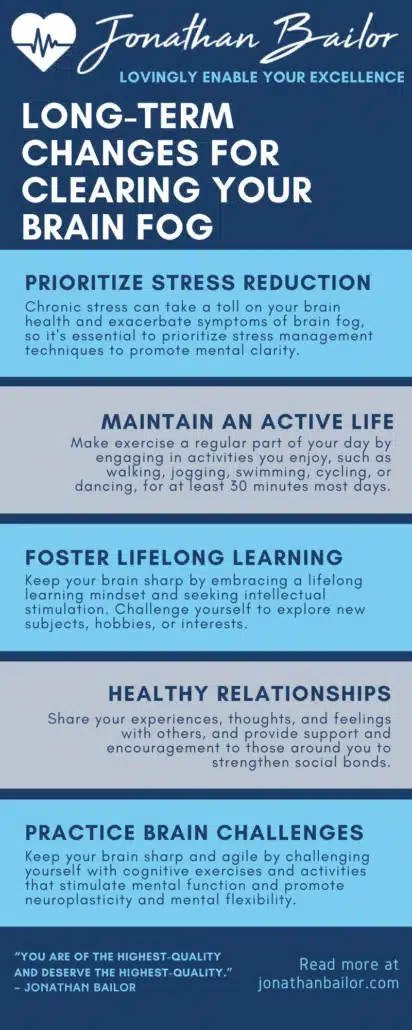20 Techniques to Reduce Brain Fog at Every Stage of Life
Brain fog and mental fatigue don’t have to be an inevitable part of your day-to-day life, regardless of your life stage. Imagine tackling your tasks and enjoying your favorite activities with clarity and focus without the persistent haze that often clouds your mind. It’s not only possible; it’s within your reach. This Brain Health Guide by Jonathan Bailor is tailored to unveil practical and effective strategies that align with your body’s natural rhythm, fostering mental clarity, improving brain functions, and minimizing brain fog at every stage of life.
The journey to a clearer mind is more straightforward than you might think. It’s about making small, manageable adjustments to your daily routine that collectively make a significant impact. Think of it as nurturing a garden; it flourishes with the proper care and conditions.
Your brain is no different. It thrives on balance, care, and attention to detail. By adopting a few key habits, you can cultivate a mental environment that supports your overall well-being, allowing you to lead a more focused and fulfilling life.
Sharing this knowledge feels like passing on a secret that shouldn’t be kept. It’s about empowering one another with the tools to take control of our cognitive health and making informed choices that resonate well beyond the confines of our minds.
So, whether you’re looking to support a loved one or enhance your own well-being, this article is designed to be your companion on the path to mental clarity and vitality at every stage of life.
Feel free to share it with friends and family on social media or via email, igniting a conversation about brain health that could benefit many. Let’s embark on this journey together, embracing each step towards a sharper, more focused mind.
Quick Fixes: Immediate Changes to Clear Brain Fog
Feeling like your mind’s stuck in a fog and needing instant relief? Here are several simple changes you can make right now to help lift that mental mist:
1. Hydrate, hydrate, hydrate
Dehydration can wreak havoc on your cognitive function, leaving you foggy and tired. Start by sipping on water throughout the day, aiming for at least eight glasses or more, depending on your activity level.
Adding a squeeze of lemon for flavor can enhance hydration and provide a refreshing boost of antioxidants to support brain health.
2. Power up with protein
Skipping meals or relying on sugary snacks can send your blood sugar levels on a rollercoaster ride, leaving you mentally drained. Instead, opt for protein-rich foods like eggs, fish, tofu, or nuts to fuel your brain and stabilize your energy levels.
A balanced meal or snack with protein, healthy fats, and fiber can keep brain fog at bay and help you stay sharp and focused.
3. Take a breath
Stress can cloud your mind and exacerbate brain fog, so take a moment to pause and practice deep breathing. Close your eyes, inhale deeply through your nose, and exhale slowly through your mouth.
Repeat this calming breath pattern for a few minutes to activate your body’s relaxation response and clear away mental clutter.
4. Move your body
Physical activity isn’t just good for your body but also for your brain. Whether it’s a brisk walk, a gentle yoga flow, or a quick dance session in your living room, moving your body can increase blood flow to your brain, boost mood-enhancing neurotransmitters, and improve cognitive function.
To maintain your mental clarity and avoid brain fog, it is recommended to engage in moderate exercise for a minimum of 30 minutes on most days of the week.
5. Prioritize sleep
Did you know that those with sleep disorders often experience brain fog? It’s true! A good night’s sleep is essential for cognitive function and mental clarity, so ensure you’re getting enough shut-eye each night.
Create a relaxing bedtime routine, turn off screens at least an hour before bed, and create a comfortable sleep environment to promote restful sleep. Try to get 7-9 hours of restful sleep each night so that you can wake up feeling refreshed, alert, and ready to tackle the day ahead.
Incorporating these immediate changes into your daily routine can help you clear away brain fog and regain mental clarity, no matter your life stage. So take action now, and start feeling sharper, more focused, and energized today!

Feeling Better Is Priceless, That's Why We Don't Put A Price On It!
“It’s Like A Free and Medically Valid Version of Noom and Weight Watchers Online”
~ Dr. Doctor Matthew Oleshiak, MD
Click the 'LEARN MORE' button below for free lifetime access to the fast fix program developed by Jonathan and top Ivy League Medical Doctors
LEARN MOREP.S. It's not a free trial. It's not part of the program for free. The entire program is free, forever, for real! No credit card needed.
Quick Wins: Short-Term Changes for Clearing Brain Fog
Ready to kick brain fog to the curb in just a few days? Here are a few effective yet simple changes you can make to start feeling sharper and more focused:
1. Cut back on caffeine
While a morning cup of coffee can temporarily boost energy, too much caffeine can leave you feeling jittery and anxious, exacerbating brain fog. Consider reducing your consumption of caffeinated drinks such as coffee, tea, and soda, particularly in the afternoon and evening.
Opt for decaffeinated options or herbal teas to support better sleep quality and mental clarity throughout the day.
2. Eat a healthy diet that includes brain-boosting foods
Incorporate nutrient-rich foods into your diet that support brain health and cognitive function. Include plenty of fruits and vegetables, lean proteins, and healthy fats like omega-3 fatty acids found in fish, flaxseeds, and walnuts.
These foods are packed with antioxidants, vitamins, and minerals that nourish your brain and help ward off mental fog.
3. Practice mindfulness
For those seeking a way to reduce stress and clear brain fog, practicing mindfulness meditation for a few minutes each day can be highly beneficial. Focusing on the breath and bringing attention to the present moment can make a significant difference in your life. Mindfulness meditation has been shown to reduce stress, improve attention and memory, and enhance overall cognitive function.
Start with a few minutes of meditation each day and gradually increase the duration as you build your practice.
4. Get sunlight exposure
Spending time outdoors and soaking up some sunlight can do wonders for your mood and mental clarity. Natural sunlight helps regulate your circadian rhythm, improve vitamin D levels, and boost serotonin production in the brain.
Aim for at least 15-30 minutes of sunlight exposure each day, preferably in the morning or early afternoon, to help reset your internal clock and enhance alertness and cognitive function.
5. Stay organized
Clutter and disorganization can contribute to feelings of overwhelm and mental fog, so take time to declutter your physical space and create a more organized environment.
Use calendars, to-do lists, and digital apps to keep track of tasks and appointments, and break larger tasks into smaller, more manageable steps to prevent overwhelm.
6. Practice deep breathing exercises
Deep breathing exercises can help calm your mind, reduce stress, and improve mental clarity by increasing oxygen flow to the brain. One effective technique for reducing stress and promoting relaxation is diaphragmatic breathing, also known as belly breathing. To practice, take a deep inhale through your nose, allowing your belly to expand, and then exhale slowly through your mouth. This simple exercise can help calm your mind and improve your overall sense of well-being.
Repeat this breathing pattern for several minutes whenever you need a quick mental reset.
Incorporating these short-term changes into your daily routine can help you clear away brain fog and feel more alert and focused in just a few days. So why wait? Take action now and reap the benefits of a sharper, more energized mind!

Stepping Stones: Medium-Term Changes for Clearing Brain Fog
Ready to take your journey to clearer thinking to the next level? Here are four medium-term changes you can make over the next few weeks to help banish brain fog and enhance cognitive function:
1. Establish a consistent sleep schedule
Aim to go to bed and wake up at the same time every day, even on weekends, to regulate your body’s internal clock and improve sleep quality. Create a relaxing bedtime routine to signal your body that it’s time to wind down, such as taking a warm bath, reading a book, or practicing gentle stretching exercises.
To ensure that you get a good night’s sleep and wake up feeling refreshed and alert, it’s important to limit your screen time before bed. Additionally, creating a comfortable sleep environment by keeping your bedroom cool, dark, and quiet can also promote restful sleep.
2. Incorporate brain-boosting supplements
Consider adding certain supplements to your daily routine that have been shown to support cognitive function and reduce brain fog. Omega-3 fatty acids, for example, found in fish oil supplements, have been linked to improved memory and attention. Other supplements like vitamin B12, D, and magnesium may also support brain health and mental clarity.
Consult a healthcare professional before starting any new supplement regimen to ensure safety and effectiveness.
3. Engage in brain-stimulating activities
Keep your mind sharp and active by engaging in mentally stimulating activities regularly. Challenge yourself with puzzles, crosswords, sudoku, or brain-training games to exercise your cognitive skills and improve memory, attention, and problem-solving abilities.
Explore new hobbies or learn a new skill, such as playing a musical instrument, painting, or learning a new language, to stimulate your brain and promote neuroplasticity, the brain’s ability to adapt and change over time.
4. Cultivate social connections
Prioritize spending time with friends, family, and loved ones to nurture your social connections and support your emotional well-being. Engage in meaningful conversations, share laughter and joy, and seek opportunities for social interaction and connection. Strong social ties have been associated with better cognitive function, reduced risk of cognitive decline, and improved overall brain health.
Make time for regular social activities and gatherings, whether a coffee date with a friend, a family dinner, or a group exercise class, to boost your mood and clear away mental fog.
Incorporating these medium-term changes into your lifestyle over the next few weeks can help you take significant strides toward clearing brain fog and improving cognitive function. So why wait? Start implementing these strategies today and enjoy the benefits of a sharper, more vibrant mind!

Foundation Building: Long-Term Changes for Clearing Brain Fog
Are you ready to lay the groundwork for lasting cognitive clarity? Here are several long-term changes you can make over the next few months to help banish brain fog and optimize brain health for the long haul:
1. Prioritize stress management
Chronic stress can take a toll on your brain health and exacerbate symptoms of brain fog, so it’s essential to prioritize stress management techniques to promote mental clarity and well-being.
Incorporate relaxation techniques such as yoga, meditation, deep breathing exercises, or progressive muscle relaxation into your daily routine to reduce stress levels and promote a sense of calm and balance.
One way to build resilience against chronic stress is to reframe negative thoughts and focus on cultivating gratitude and optimism.
2. Maintain an active lifestyle
Regular physical activity is not only good for your body but also crucial for maintaining optimal brain health and cognitive function. Make exercise a regular part of your routine by engaging in activities you enjoy, such as walking, jogging, swimming, cycling, or dancing, for at least 30 minutes most days of the week.
Incorporate a mix of aerobic exercise, strength training, and flexibility exercises into your workout routine in order to promote overall health and enhance cognitive function. Stay active at various times throughout the day by adding movement into your daily activities, such as taking the stairs instead of the elevator, parking farther away from your destination, or doing household chores.
If you exercise regularly, you’ll be amazed at the positive changes in your mental health.
3. Foster lifelong learning
Keep your brain sharp and engaged by embracing a lifelong learning mindset and seeking intellectual stimulation and growth opportunities. Challenge yourself to explore new subjects, hobbies, or interests that pique your curiosity and expand your knowledge base.
Take classes, attend workshops, read books, listen to podcasts, or watch documentaries on topics that interest you to keep your mind engaged and promote cognitive flexibility and creativity. Stay curious and open-minded, and embrace opportunities for personal and professional development to continue learning and growing throughout your life.
4. Cultivate healthy relationships
Invest in nurturing and meaningful relationships with friends, family, and loved ones to support emotional well-being and cognitive health. Surround yourself with supportive and positive individuals who uplift and inspire you, and make time for regular social interactions and meaningful connections.
Share your experiences, thoughts, and feelings with others, and provide support and encouragement to those around you to strengthen social bonds and promote a sense of belonging and connection.
Prioritize quality time spent with loved ones, whether it’s sharing meals, engaging in activities together, or simply enjoying each other’s company, to foster strong and lasting relationships that contribute to overall well-being.
5. Practice cognitive challenges
Keep your brain sharp and agile by challenging yourself with cognitive exercises and activities that stimulate mental function and promote neuroplasticity. Engage in brain games, puzzles, memory exercises, or strategic board games to exercise different cognitive skills such as memory, attention, problem-solving, and decision-making. Challenge yourself to learn new skills or languages, engage in critical thinking and problem-solving tasks, or explore creative pursuits to keep your brain active and adaptable.
Incorporate variety and novelty into your cognitive challenges to stimulate different areas of the brain and promote cognitive reserve, the brain’s ability to withstand age-related changes, and maintain function over time.
Incorporating these long-term changes into your lifestyle over the next few months can help you improve brain function and build a solid foundation for lasting cognitive health and clarity. So why wait? Start implementing these strategies today and invest in a brighter, sharper future for your brain!

Brain Health FAQ: Your Guide to Cognitive Clarity
Are you curious about how to optimize your brain health and promote cognitive clarity? Check out these frequently asked questions to learn more about brain health and discover practical strategies for maintaining mental sharpness and vitality.
Q1: What are some lifestyle factors that affect brain health?
Your lifestyle plays a significant role in shaping the health and function of your brain. Factors such as diet, exercise, sleep, stress management, social connections, and cognitive stimulation all influence brain health.
Eating a balanced diet rich in fruits, vegetables, lean proteins, and healthy fats provides essential nutrients that support brain function. Engaging in regular physical activity enhances blood flow to the brain and stimulates the growth of new brain cells. Prioritizing quality sleep allows your brain to rest and recharge, supporting memory consolidation and cognitive function. Managing stress effectively reduces the risk of chronic inflammation and oxidative stress, which can damage brain cells over time.
Maintaining strong social connections and participating in mentally challenging activities also contribute to brain health and resilience.
Q2: How can I improve my memory and cognitive function?
Several lifestyle strategies can help improve memory and cognitive function.
Engage in regular physical exercise, which has been shown to enhance memory, attention, and learning. Challenge your brain with cognitive activities such as puzzles, crosswords, sudoku, or brain-training games to stimulate neural connections and promote cognitive flexibility. Practice mindfulness and relaxation techniques to reduce stress and enhance focus and concentration.
Get enough quality sleep each night to support memory consolidation and cognitive processing. Consider incorporating brain-boosting foods into your diet, such as fatty fish, berries, nuts, seeds, and leafy greens, which are rich in nutrients that support brain health and function.
Q3: What role does nutrition play in brain health?
Nutrition plays a crucial role in brain health, providing essential nutrients that support brain function, affect cognitive function, and protect against cognitive decline.
A balanced diet rich in fruits, vegetables, lean proteins, and healthy fats provides vitamins, minerals, antioxidants, and omega-3 fatty acids that support brain health. Certain nutrients, such as vitamin E, vitamin C, B vitamins, and omega-3 fatty acids, have been linked to improved cognitive function and a reduced risk of age-related cognitive decline. Antioxidant-rich foods such as berries, nuts, seeds, and leafy greens help protect brain cells from damage caused by oxidative stress and inflammation.
Consuming a variety of nutrient-dense foods and staying hydrated are essential for maintaining optimal brain health and cognitive function.
Q4: What are some common signs of cognitive decline?
Cognitive decline is a natural part of aging, but certain signs may indicate more severe cognitive impairment or neurodegenerative conditions such as Alzheimer’s disease or dementia. Chronic fatigue syndrome can also cause brain fog symptoms.
Common signs of cognitive decline include memory loss, poor concentration or attention, language problems such as trouble finding words or understanding speech, impaired judgment or decision-making, and changes in mood or behavior. Other symptoms may include confusion, disorientation, difficulty performing familiar tasks, and other signs of poor cognitive performance, as well as changes in personality or social behavior.
If loved ones experience persistent or worsening cognitive symptoms or develop brain fog, it’s essential to seek medical evaluation to determine the underlying cause and appropriate treatment. If you experience brain fog, you should also seek a medical assessment.
Q5: How can I support brain health as I age?
As you age, it’s essential to prioritize brain health and take proactive steps to support cognitive function and vitality. Adopting a brain-healthy lifestyle that includes regular physical activity, a balanced diet, quality sleep, stress management, social engagement, and mental stimulation can help preserve brain health and reduce the risk of cognitive decline.
Stay mentally active by challenging your brain with new activities, learning opportunities, and social interactions. Manage chronic health conditions such as high blood pressure, diabetes, and heart disease, as these conditions can increase the risk of cognitive impairment. Stay socially connected and maintain strong relationships with friends, family, and loved ones to support emotional well-being and cognitive function.
By adding these strategies into your daily routine, you can support brain health and enjoy a vibrant and fulfilling life at every stage of adulthood.
Embrace Clarity: Concluding Thoughts on Banishing Brain Fog
As you embark on your journey to clearer thinking and improved cognitive function, remember that small changes can lead to significant improvements in brain health. By incorporating the techniques outlined in this article into your daily routine, you can support optimal brain function and enjoy greater mental clarity and vitality at every stage of life.
Don’t keep these valuable insights to yourself—share them with friends and family on all your favorite social media platforms and via email. Let’s empower each other to prioritize brain health and live our best lives. Here’s to a future filled with clarity and cognitive vitality!
Feeling Better Is Priceless, That's Why We Don't Put A Price On It!
“It’s Like A Free and Medically Valid Version of Noom and Weight Watchers Online”
~ Dr. Doctor Matthew Oleshiak, MD
Click the 'LEARN MORE' button below for free lifetime access to the fast fix program developed by Jonathan and top Ivy League Medical Doctors
LEARN MOREP.S. It's not a free trial. It's not part of the program for free. The entire program is free, forever, for real! No credit card needed.




